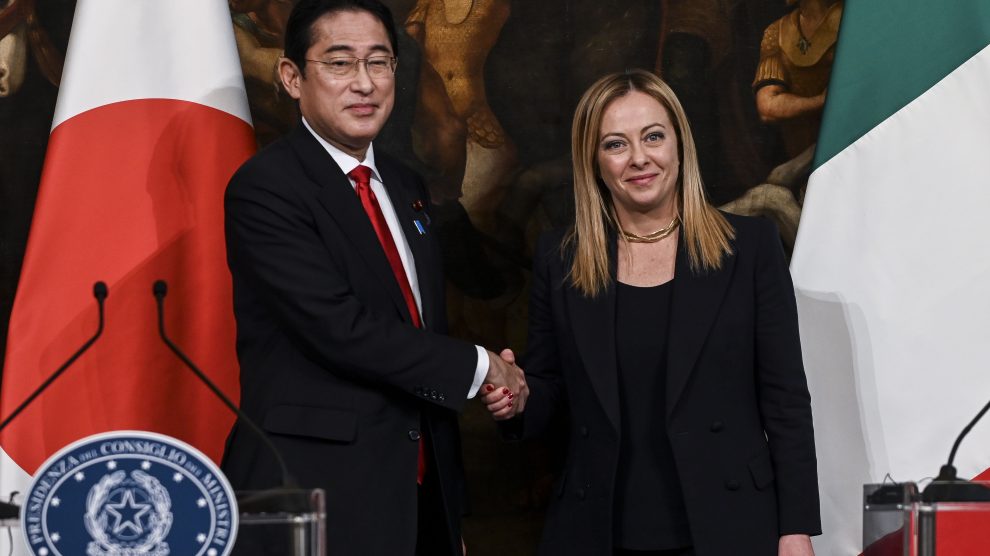Rome and Tokyo upgrade ties. Italian PM Giorgia Meloni and her Japanese counterpart Fumio Kishida agreed on Tuesday to the bilateral relations to a strategic partnership.
- “This is a significant step that involves strengthening our contacts at every level and opening up new prospects for our citizens and businesses,” said PM Meloni
- She also announced the launch of a bilateral Foreign Affairs-Defence consultation mechanism, which is slated to meet for the first time later this year.
- “It is important” that Italy and Japan, “bound by mutual trust and commonality of purpose, pursue stable cooperation in trade, investment, research and development,” said PM Kishida.
Warming up (for the G-7). Tuesday’s was the first bilateral between the two leaders since the November meeting on the sidelines of the G20 in Bali, Indonesia, was postponed after missiles fell in Poland amid the war in Ukraine.
- Rome is the second stop on Mr Kishida’s diplomatic tour in Europe and North America to prepare the ground for May’s G7 summit in Hiroshima.
- “He wants to explain Japanese goals and objectives for the meeting and make sure there are no points of unnecessary friction”, Brad Glosserman, deputy director of and visiting professor at the Center for Rule-Making Strategies at Tama University, told our sister website Formiche.net.
- The meeting and working lunch lasted longer than expected. The atmosphere was “very productive,” a Japanese diplomatic source told Decode39. PM Meloni, on her part, said it revealed “a strong convergence of views on the main points of the Japanese G-7 presidency.”
- In 2024, it will be Italy’s turn to assume that role.
- At the G-7 level, said Mr Kishida, “we need to show firm resolve to condemn the nuclear threat and defend a free and open international order. In particular, be cohesive in the face of Russian aggression and continue and strengthen both tough sanctions against Russia and firm support for Ukraine.”
Shifting perspectives (and better warplanes). The war highlighted that Euro-Atlantic and Indo-Pacific security is “indivisible,” as PM Kishida. He also appreciated Italy’s interest in the Indo-Pacific area and PM Meloni’s support for the new national security documents released last month.
- In December, the Italian, Japanese and British governments agreed to jointly develop a sixth-generation combat aircraft (known as the Global Combat Air Programme, or GCAP). That is likely to become a driving force within the Italo-Japanese relation.
- The programme “will have important spillover effects on productive sectors, including in the civilian sphere, and in the area of scientific research,” noted Ms Meloni.
- On his part, Mr Kishida said he expected the collaboration to “stimulate cooperation between the industries of the respective countries, trigger broader effects in society and the economy, and lay the foundation for medium- and long-term bilateral cooperation in the field of security.”
- He cited diplomacy, investment, railways and cinema among the areas of interest for bilateral cooperation.
Steeling industrial ties. Trade-wise, relations are strong: commerce between Italy and Japan, the world’s eighth- and third-largest economies, respectively, is worth over €12 billion. It’s also growing steadily and has ample space to develop in as-of-yet untapped sectors: green energy (notably solar PV and hydrogen) and infrastructure.
- Academic collaboration between the two countries is also strong. But industrial ties may yet improve in crucial sectors such as space and aerospace.
- That all depends on whether there will be the right political and diplomatic push from both Japan and Italy, whose recent Asian efforts have been overly focused on China – chiefly through the 2019 signing of the Belt and Road Memorandum of Understanding, which didn’t produce much trade-wise and resulted instead in multiple security concerns.
Bottom line: the G7 ministerial meetings may be the right opportunity to deepen relationships and consultations. Even though defence is not a G7 subject matter, diplomacies are already working on flying Defence Minister Guido Crosetto to Japan.
- That trip could be part of a broader Asian diplomatic mission, which might touch Indonesia – giving Mr Crosetto a chance to meet his local counterpart Prabowo Subianto, who already expressed his appreciation for Italy’s commitment to the current geostrategic framework and its technological excellence.





